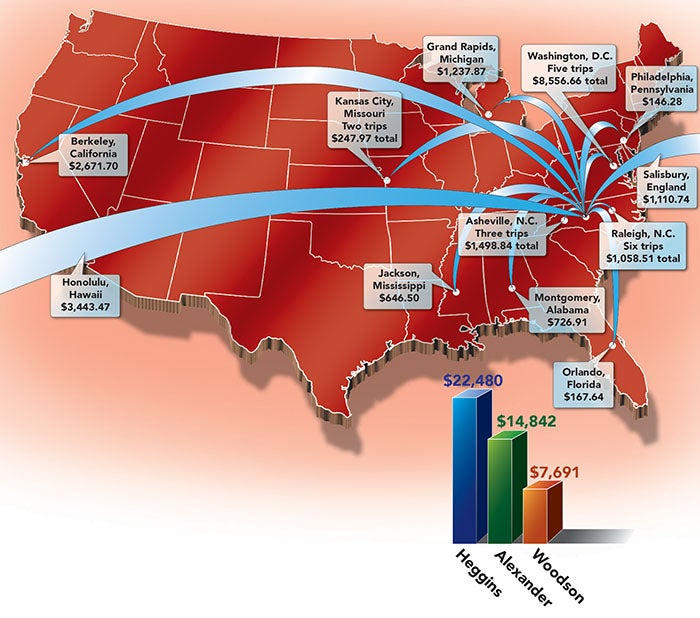Editorial: City Council must ensure trips are worthwhile
Published 12:00 am Sunday, September 8, 2019

- Some of the official travels that Mayor Heggins has made during her time in office. Graphic by Andy Mooney, Salisbury Post.
Neither the mayor nor council members should have to pay personally for justifiable trips during which they represent they city of Salisbury in an official capacity.
But how much is too much when it comes to council members traveling on city business?
Post reporter Liz Moomey wrote in today’s Post that Mayor Al Heggins has spent $22,468.63 in taxpayer dollars on travel, including reimbursements, in her 20 months as mayor. Put another way, she’s spent roughly $1,123.43 per month and is on track to reach about $27,000 in her current term. And that’s in addition to a small monthly allowance council members receive.
Heggins spending $22,468.6 to date on travel may seem like too much to some in Salisbury, but an analysis can’t be based on the dollar figure alone. Whether it’s a conference or something else, travel expenses should be judged first on the merits of the trip and results produced.
Mayor Pro Tem David Post, for example, has traveled to a broadband conference multiple times. He took the trips before he became mayor pro tem. Other council members before Post took the trip, too. And it made sense. The city owned a fiber optic network, Fibrant, and Salisbury needed to talk to others in the business about best practices and industry trends.
From his trips, Post made a connection with Hotwire, which now manages the city’s network. It’s too soon to make a judgment about whether the Hotwire arrangement will be a prove worthwhile, but the city’s cost of any past trips to the broadband conference can be justified by the relationship formed with company.
Post’s trips to the broadband conference should not be the benchmark for travel spending, but it should serve as an example of what can happen when things go well.
An example of a shamefully poor choices was when the Landis Board of Aldermen spent almost $17,000 in 2015 to attend a three-day ElectriCities conference in Myrtle Beach, S.C. Sure, Landis runs an electrical system and is part of the ElectriCities organization, but there’s no conceivable, justifiable reason why five aldermen spent that much. Importantly, it changed nothing about the town’s exorbitant electricity rates. And one alderman admitted to the Post at the time that he and his wife took a side trip to Charleston, S.C., and charged a meal there on the town credit card.
Heggins’ travel expenses have not brought the same benefits as the broadband conference and they are far from being as severe as what occurred in Landis. The broadband and Landis trips serve as examples of two ends of the spectrum.
However, in Heggins’ case, there are questions unanswered about the benefits of the trips to the city.
For example, Heggins told the Post that she learned at one conference about ensuring opportunity zones — a tax shelter that allows investors to invest their gains in historically low-income areas — benefit the community, not just investors. We’ve seen little, if any movement, on that by Heggins or the council. And to be clear, there are several census tracts designated as opportunity zones in Salisbury and Rowan County.
Council members owe it to taxpayers and voters to implement ideas that they believe are worth traveling for. And at a minimum, the Salisbury City Council should work to create more finite rules about travel expenses. A starting place is for council members to talk among themselves in advance about which trips are worth taking.
Those conversations must go better than one that occurred in 2018, when just $1,060.60 for a trip to Salisbury, England, our sister city, drew criticism from other council members and accusations of racism from others.
To ensure that people of all economic backgrounds can serve, council members shouldn’t be asked to pay for worthwhile trips, but there needs to be more discussion about and well-defined rules for which are trips are OK.
Editor’s note: This editorial was updated at 4 p.m. Sept. 12 to clarify that dollars figures cited were a total of all travel related expenses incurred by the city, including reimbursements.


